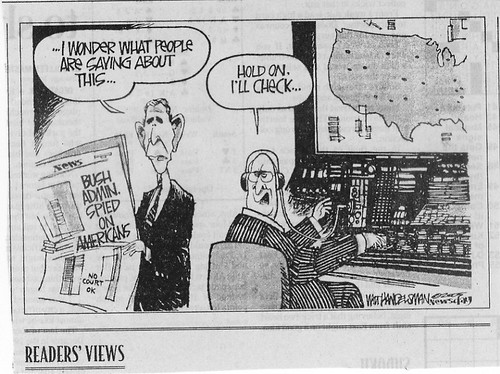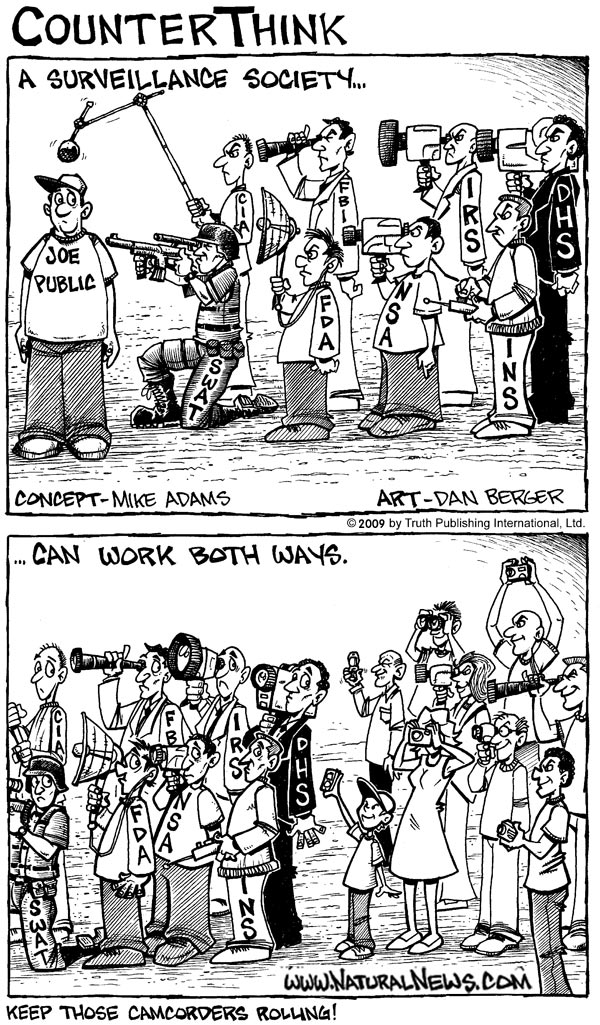We may be the last generation that will have ever known privacy.
Every day, we are one step closer to the Total Surveillance Society. Every day, we lose a little more of that part of being human that claims the right to be left alone, that knows freedom from the prying eyes of the corporate state, that has the boldness to claim some inner sanctum where the all-seeing eyes of technology cannot penetrate.
The dystopian dreams of mid-20th Century writers like George Orwell, Aldous Huxley, Philip K. Dick and Barry Malzberg are coming true all around us, but it seems the majority of citizens are so dazed by mass media distractions, by government-instilled fear, and by the drudgery of their daily existence that they can't be bothered to wake up and take stock of what is being taken from them.
Our telephones don't just transmit our voices from point A to point B anymore. The government is there in the middle between us and those with whom we speak, listening, analyzing, weighing the possibility that we are Enemy Combatants who should be whisked away in the dead of night and stored in a cage from which we'll be periodically extracted for "harsh interrogation."
The telecom companies which have been entrusted with the sanctity of our private conversations have not only rolled over -- all of them but Qwest and CREDO Mobile, anyway. They have acquiesced to the demands of government that they allow federal goons to hover over our every word. They have been paid handsomely for their complicity, but at the cost of their humanity and our freedom. And now they have been told by a spineless and morally bankrupt Congress that they won't ever be held accountable; that it's OK to break the law when the President tells you to do it. If you are rich and powerful enough to buy Congressmen, then the law apparently wasn't meant to apply to you, anyway.
The telecom companies (again, with the notable exceptions of Qwest and CREDO) have no problem at all handing the info over to the government -- and that's
without a court order. And as we sadly found out July 9, a spineless Senate (with the exception of 28 true patriots) is more than willing to give them carte blanche to do so, by including telecom immunity in the FISA bill.
"Congress has been far too compliant as President Bush undermined the Bill of Rights and the balance of powers,"
The New York Times editorialized on July 8. According to the
Times, the FISA bill just approved by both the House and Senate needlessly expands the government's ability to spy on Americans and ensures that the country will
never know the full extend of President Bush's unlawful, warrantless wiretapping.
Even though the old FISA law, enacted in 1978 as a response to the abuses perpetrated by the Nixon administration, created a court which, over a 30-year period,
approved nearly 20,000 wiretapping warrants while rejecting perhaps a half-dozen, according to the
Times, and in any case, the government can wiretap first and get permission later in moments of crisis, that wasn't enough for Bush and an eerily compliant Congress. The new bill, the
Times said, makes it much easier to spy on Americans at home, reduces the courts' powers and grants immunity to the companies that turned over Americans' private communications without a warrant.
The new FISA bill, now the law of the land thanks to an imperial president and a spineless Congress, allows the government to bypass the FISA court entirely and collect large amounts of Americans' communications without a warrant simply by declaring that it is doing so "for reasons of national security."
"It cuts the vital "foreign power" provision from FISA, never mentions counterterrorism and defines national security so broadly that experts think the term could mean almost anything a president wants it to mean," the
Times noted.
Apparently Congress goes along with the attitude that if you're the President or his lackeys in the intelligence agencies, you don't follow the law -- you ARE the law, and you make it up as you go along, spinning lies upon lies as you gut the Constitution, barely able to conceal your contempt for the weak legislative branch which cowers at the mention of those nebulous bad men who are supposed to be such a threat to our freedoms that we should give them up preemptively.
Our computers don't just connect us to the World Wide Web anymore. Now instead of just being our dumb servants they are silently, secretly reporting on us, every moment of our surfing, every click, every choice, every view open to review by those governmental or corporate entities large enough to laugh at our pitiful expectations of privacy and autonomy.
Highly classified programs are run by a variety of federal intelligence and law enforcement agencies. Government agents are hunched vulture-like over their desks at this very minute, observing, storing and analyzing the communications, spending habits and travel patterns of U.S. citizens, searching for "suspicious activity," with all the breadth and ambiguity -- and potential for practically inevitable abuse -- that phrase implies.
Where can this "thought crimes" mindset lead?
A 23-year-old journalism student and reporter has been sentenced to death in Afghanistan for an Internet download that the government deemed "counter to Islam."
The Iranian parliament is set to debate the death penalty for bloggers who "harm mental security in society."
The U.S. government's warrantless surveillance of its own citizens includes data-mining programs that allow the National Security Agency (NSA) and the Federal Bureau of Investigation (FBI) to sift through large databanks of emails, phone calls, and online transactions and conversations, not for specific information, but in search of suspicious patterns. It's all grist for the dark satanic mills of a world view based on fear, secrecy and suppression.
Information as seemingly routine as everyday bank transactions is kept in databases similarly monitored by the Central Intelligence Agency (CIA), Homeland Security and the Drug Enforcement Agency (DEA).
Hidden in current Senate housing legislation is
a sweeping provision authored by Senator Charles Grassley (R-IA) that affects the privacy and operation of nearly all of America's small businesses. The provision, which was added by the bill's managers without debate a couple of weeks ago, would require the nation's payment systems to track, aggregate, and report to the federal government information on nearly every electronic transaction.
"There's virtually no branch of the U.S. government that isn't in some way involved in monitoring or surveillance," said Matthew Aid, an intelligence historian and fellow at the National Security Archives at The George Washington University. "We're operating in a brave new world."
"You don't have to look far into history to know that when the government, any government, is given secret authorities, that those authorities are ultimately abused," Mike German, a former FBI agent who is now policy counsel for the American Civil Liberties Union (ACLU)
told the Baltimore Sun. "You don't even have to attribute bad motives to anyone. In an intelligence officer's zeal to protect the country, they often will overstep their bounds."
"We should have what Canada has, which is a minister of privacy, someone looking out for the privacy issues of Americans," James Bamford, an intelligence expert and author on two books about the history of the NSA,
told Sun reporter Bradley OIson. "We have armies of people out there trying to pick into everyone's private life, but we have nobody out there who's an advocate."
The big corporations aren't content to let their servants in government feed alone at the overflowing data trough.
The Wall Street Journal and the
Los Angeles Times reported on July 8 about concerns that non-government surveillance is being abused for advertising purposes. Yesterday, the Senate Commerce, Science and Transportation Committee held
a hearing on the privacy issues raised by online advertising. Critics, meanwhile, are questioning whether the practices used by NebuAd and other ad-targeting companies violate wiretap laws, which prevent carriers from monitoring customer communications.
Public outcry, along with questions by two key members of Congress about the legality of such tracking by ISPs, led Charter Communications to announce in June it was indefinitely delaying using NebuAd's service. Reps. Edward J. Markey (D-MA) and Joe Barton (R-TX), wrote to Charter in May
(PDF download here) saying they believed that ISPs using NebuAd's technology might violate federal laws designed to protect the privacy of personal information collected by cable companies about their subscribers.
Big porkers like international media conglomeration Viacom want to know you better, and not just for marketing purposes.
Viacom decided to demand your information from Google (owners of YouTube), so they sued and won in court. Louis L. Stanton, a Reagan-appointed federal judge in New York, on July 3 ordered Google to give up the information on all YouTube users, including every video they'd ever viewed, posted, and even videos that were posted and then deleted.
If you've ever visited YouTube even a single time and watched a single video, Viacom's now got your IP address.
That's right -- this big media company considers every video you've ever watched on YouTube as being their business. They have been given the data on your own personal viewing history. Viacom is in effect going after its own customer base, on the assumption of wrongdoing on your part, and they obviously have no problem violating your right to privacy.
This is despite the fact that when you click on a video, you in many cases have no way of knowing if the material is copyrighted or not. And it is despite the fact that consumers like you, under Fair Use doctrine, are supposed to be able to upload copyrighted material for the purposes of commentary, criticism, satire, parody, education or discussion.
Viacom is counting on the sheep-like apathy of the American consumer to shield it, as a corporation, from any consequences. But YouTube viewers -- who are, of course, also Viacom customers -- are organizing themselves in a
boycott of Viacom, which is the parent company of Paramount studios, DreamWorks Animation, CMT, Rhapsody, MTV, Comedy Central, BET, Nickelodeon, and Spike.
It shouldn't be a big surprise to anyone (except, apparently, Viacom), that when a company gets this nosy, it's going to create
a lot of consumer resentment.
Viacom says that it wants to prove that users watch more copyrighted TV programs than user generated content on YouTube. What they are also proving probably intentionally, is that (a) when you're watching YouTube, they are watching you and taking notes; and (b) you'd better not post any of their programming, or even
watch it when someone else has posted it.
According to
YouTube's own blog, "YouTube received a court order to produce viewing data from our database, including usernames and IP addresses. In order to protect our community's privacy, we strongly opposed this motion when Viacom and others filed it. The court felt differently and ordered us to produce the data. Viacom said that they need general viewing information to determine the proportion of views on YouTube of copyright infringing content vs. non-infringing content."
YouTube argued that since IP addresses and usernames aren't necessary to determine general viewing practices, they should be allowed to remove that information before they hand over the data that Viacom is seeking.
"We'll continue to fight for your right to share and broadcast your work," YouTube assured its viewers. "The court did impose some encouraging limits -- they agreed with us that Viacom should not have access to private videos or our search technology. Also, the information we provide will be designated highly confidential under court order and only Viacom's outside counsel and experts will have access to it."
Somehow, when a federal court case to prove copyright violation is in the works and it involves your name and viewing habits, that's not all that reassuring.
Even more troubling is the terrible legal precedent that it sets.
See that big open door there -- the one Viacom and a clueless federal judge just opened? Yeah, that's the one. The one through which other companies are now going to hand out your personal data, including what you view, read, say, and do online, every time some authority figure asks for it.
There could be very dangerous times ahead for free expression on the internet. Imagine if someone in the intelligence agencies of government or corporate America decides they want to know everything you've ever dugg or submitted on social news networks like
Digg.com or
Reddit.
I don't think I have to tell you that it's quite probable that everything we blog or digg or comment, is being watched -- and evaluated. Some of us will at some point likely end up being "examples."
 How To Fight Back
How To Fight Back
The Internet itself, while compromised in the sense that it is being watched, is still one of the most potent forces for the freedom of thought and expression in our society.
There are people and groups fighting for your freedom and for the freedom of information. Among them are:
?
Electronic Freedom Foundation (EFF), the leading civil liberties group defending your rights in the digital world.
?
American Civil Liberties Union, which has announced its plans to challenge the new FISA law in court. "This fight is not over," said Jameel Jaffer, director of the ACLU National Security Project. "We intend to challenge this bill as soon as President Bush signs it into law. The bill allows the warrantless and dragnet surveillance of Americans' international telephone and email communications. It plainly violates the Fourth Amendment."
?
Strangebedfellows, a unique and diverse left-right coalition which has come together to put a stop to the eradication of civil liberties in America. Modeled on a similar group in Britain, the initial Strangebedfellows group encompasses Ron Paul supporters, leading bloggers from the left (Glenn Greenwald of
Salon.com, Jane Hamsher of
firedoglake.com) and many more who share the view that warrantless surveillance, telecom immunity and other such outrages of the lawless surveillance state
must end.
? The folks behind
The Pirate Bay, a torrent file downloading site, have started to work on
a new encryption technology that could potentially protect all Internet traffic from prying eyes.
A surveillance society can work in both directions. The wide proliferation of camcorders, cell phones, and recording devices of various kinds gives we the people a way to at least record, if not prevent, the misdeeds of our corporate and governmental overseers.
The rapid dissemination of this relatively unfiltered user-generated content through blogs, through YouTube, through Digg and through social networks such as Facebook and MySpace is one antidote to those gatekeepers who would impose conformity of thought and homogeneity of information upon us.
Don't let 'em take your camera. Don't let 'em take your Internet. Don't let 'em take your independence. Don't let 'em take your cussedness.
"You cannot oppress the people who are not afraid anymore." ~ Cesar Chavez











